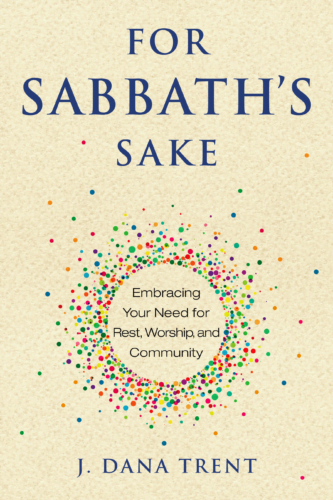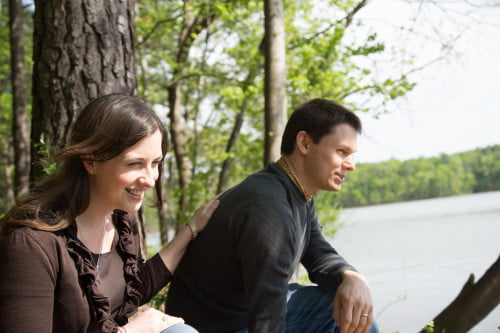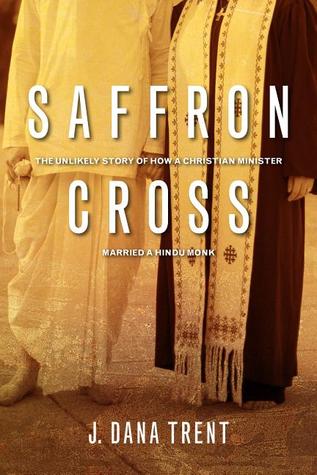 I am so glad that my friend, J. Dana Trent has brought For Sabbath's Sake: Embracing Your Need for Rest, Worship and Community into the world (released last Sunday!)
I am so glad that my friend, J. Dana Trent has brought For Sabbath's Sake: Embracing Your Need for Rest, Worship and Community into the world (released last Sunday!)
For the world needs more conversations about the hard practice of stopping, remembering and being connected to our Creator. We forget so often. We think we're in charge of our own lives. Our busyness blinds us.
We NEED SABBATH.
As for me, I’ve always been a much better do-er than I have a wait-er or rest-er. (Yes, you can read into that I'm an Enneagram 3).
As a child, I hated teacher workdays and federal holidays because they threw off my productive routine. I begged to go to school even as my parents reminded me no one would be there. I couldn’t stand to be idle at home.
As a college student, I was never really good at taking days off either. I was known to hit the library right after church on Sunday and sometimes on Saturday afternoons too (real buzz kill I know).
And now as a new mom, I hardly know what Sabbath days are anymore. My only Sabbath practice is that we do not turn on the washer or dryer on Sundays. Nor do we fold clothes. (Though I have to say if we have a major meal time explosion, we break our own rule).
On my plate is seven days of work both outside and inside the home. I love my life, but . . .
Reading For Sabbath's Sake in the midst of my current state of SO MUCH going on was a wake-up call.
Not only did I have to slow down long enough to finish a whole book (something that feels like such a feat these days) but Dana's story opened my eyes to places in my life that could be more life-giving and restful even if these places didn't look like my pace before a little person came into my home.
For Sabbath's Sake reminded me of the joy of having unplanned days-- even if I was still in "mom mode" a day could be set aside for play. I could let my daughter be the lead.
For Sabbath's Sake reminded me of the importance of having more than just text conversations with the dearest of friends. More often than not, I need to pick up the phone and call people and clear out time in my schedule (and hope they did in theirs) to hear how they are really doing. And IRL (in real life) talks were even better!
For Sabbath's Sake reminded me of the element of economic resistance in Sabbath keeping-- everyone needs time off in their week. My habit of going to the grocery store on Sunday night might be keeping one of my neighbors from their gift of sabbath. I could wait till Monday morning.
These are small drops into a big bucket of course in our world that is FAST, FAST, FAST and NOW, NOW, NOW. But after reading For Sabbath's Sake, I was left with guiding ideas that I could practice given all the other things going on in my life.
When I reviewed this book prior to publication, this was my endorsement and call to action to the church:
"J. Dana Trent has one message for those who say in the church ‘I’m too busy for Sabbath keeping:’ your busyness means you need it even more!
For Sabbath’s Sake is a spiritual jolt back into learning what it means to set aside time for rest in the age of an ever beeping smart phone and exploding calendar. It’s just the book every congregation needs to study together for a reminder of our identity as Sabbath people."
And I stand by these words even now as I have my very own copy of #ForSabbathsSake in my hands. Every congregation needs to pick up a copy of this book. Your soul will thank you for doing so. I know mine did!
______________
Bulk Orders: Upper Room Books provides bulk discounts on orders for churches, faith-based groups, and nonprofits. Considering order in bulk for your next congregational workshop, retreat, sermon series, Sunday School class, or small group. Call Upper Room Books Customer Service at 1-800-972-0433
Amazon: Order print and Kindle versions here.
Today marks the final installment of my summer blog series on Pentecost with a fabulous word from my seminary classmate and friend, Dana .Dana has a powerful story to tell and I'm glad to have her words to share with you here. If you've missed any of these posts, might I suggest catching up before you start with this post one explaining the series.
 The Turning Point: How the Spirit Changes Everything
The Turning Point: How the Spirit Changes Everything
I was baptized on Pentecost by an ordained woman serving south of the Mason-Dixon line, a miracle for Baptist churches of the 1990s. At that time, only the most progressive worshiping communities were hiring female ministers to serve in a capacity other than serving as Christian educators.
That Pentecost morning, I was born into the Christian community with water and Spirit. But my baptism sparked a chain of events that would, ultimately, reach beyond the membership of Christ’s Church. It would lead to my early Christian formation, my decision to attend seminary, my ordination—and—an extraordinary turning point—my marrying outside the Christian faith.
Pentecost: A Promise Comes to Life
Pentecost marks a liturgical season in which the Christian Church celebrates exactly how she became Church: through the work of the Holy Spirit, received by the apostles and other followers of Christ in Acts 2.
At the ascension, Jesus told his disciples that “John baptized with water, but you will be baptized with the Holy Spirit” (Acts 1:5, NRSV).
Jesus’ promise manifested days later, when the followers of Christ were gathered for Shavuot the Jewish Feast of Weeks that commemorates the law given at Mount Sinai. Scripture tells us that “tongues of fire” rested on them, offering the power of God through the Holy Spirit.
It was their turning point.
The Fruit of the Spirit
Later, in Paul’s letter to the Galatians, we learn more about what this “turning point” brought to the Christ-followers: the empowerment to share Jesus’ birth, life, ministry, death, and resurrection to all whom they met. We know that the power of this Spirit spread, and it bore the fruit of love, joy, peace, patience, kindness, generosity, faithfulness, gentleness, and self-control (Galatians 5:22-26).
But Paul cautioned the early fledgling church: “if we live by the Spirit, let us also be guided by the Spirit” (Galatians 5:25).
Then and now, this means fostering a posture of love and humility.
But that is not how many people would describe the trajectory of the modern Christian Church.
As Christian minister married to a devout Hindu, I’ve seen first-hand the hatred Christians can spew toward non-Christians. And, that is not the work of the Spirit that was so graciously bestowed upon us in Jesus’ absence.
When we concede that we know all there is to know about God, sacred texts, and how religion should be run, we’ve neglected our Pentecost roots. We’re forgetting the “turning point” in which the Church was birthed. The Spirit was not given to us to spread dogma and draw lines between who’s in and who’s out. The Spirit was given to unite us.
Perhaps the “turning point” we need in 2014 is to re-visit Acts 2 and remember the “awe that came upon everyone” that day. It was a day of unity, not division.
 One Spirit: Interfaith Marriage
One Spirit: Interfaith Marriage
Since marrying Fred, I find myself advocating for how the Spirit unites us across religious and non-religious boundaries. I believe in a God who is Creator of us all—not an exclusive God who loves and listens to a chosen few.
But, we often take the initial reaction the onlookers had at Pentecost. We assert that those who are eager to unite are actually “drunk” with ignorance. We have difficulty conceiving that there are mysterious forces that unites us, not divide us.
While my mixed-faith marriage challenges everything I’ve known to be “true,” living with a Hindu helps me see the unifying Spirit at work. Our willingness to learn more about one another’s spiritual journeys is how we reach the pivot: when we look closer, we discover connections we never dreamed possible. And that is our turning point.
J. Dana Trent is an ordained Baptist minister and the author of Saffron Cross: The Unlikely Story of How a Christian Minister Married a Hindu Monk. When she’s not procrastinating with episodes of “The Young and the Restless,” Dana blogs at jdanatrent.com and tweets @jdanatrent.
 We live in a growing interfaith world.
We live in a growing interfaith world.
We simply do not marry or interact or learn from people who come from the same exact faith background as us.
Rarely do any us stay "one thing" our whole life without influence from another tradition. And, because of social media, have so many opportunities to know who God by route of those who might call God a different name than us.
Today I'm sharing the story of how I released the exclusive beliefs of my childhood through relationships with interfaith friends. I know the teachers of my evangelical past might say that I've lost my way, but I've chosen love and shared wisdom over judgment. Here's my surprising conversion:
The first time I heard the phrase “God is too big for any one religion” I was in seminary in North Carolina.This statement was found on a bumper sticker on my roommate’s car. I looked at it every morning when I walked out of the house to go to school. I was intrigued, but confused.
Growing up with a “Jesus is the only way to God” upbringing, I had no idea about what to think of my Baptist soon-to-be clergy friend’s bold declaration on her car.
Was she crazy being so public about her inclusive theology in the Bible Belt? I worried about her safety on the road.
Several years later I found myself pastoring full-time in the Washington DC area—the land of much cultural and ideological diversity. In my free time, I dated Kevin, also a Baptist, who lived in a shared house in the city with two other guys. I liked them a lot. They were funny, smart and accepting of my growing presence in their home. They just so happened to be Hindu and Baha’i.
Read the rest over at my friend, Rev. J. Dana Trent's blog.
 Next week, a dear friend from seminary is hitting an amazing life milestone. J. Dana Trent's first book: Saffron Cross will be released.
Next week, a dear friend from seminary is hitting an amazing life milestone. J. Dana Trent's first book: Saffron Cross will be released.
And I think you should read it. Not just because I know and like Dana as a person, but because I've read it and know you'll love it too.
Saffron Cross is a breath of fresh air to the conversation not only about interfaith marriage but what it means to live in an interfaith society.
With careful attention to not only her experience of Christianity but the Hinduism of her husband, Dana provides a grace-filled memoir of what it looks like to embrace the faith of another not only when it is sexy but also when it is not.
In a culture where it is assumed that 1+1 faith = no faith at all, Dana provides a vivid portrayal of how she and her husband, Fred are forging a new path-- a path rich in mutual learning, compromise, but most of all love for one another's faith experiences.
As you read Saffron Cross not only will you grow alongside the author both in the foundational principles of Christianity and Hinduism-- which Dana Trent does a great job of describing-- but of what deepening a spiritual life looks like in a modern paradigm.
We learn from Dana that just because you are ordained in a tradition, it doesn't mean its faith has yet seeped its way into you.
We learn from Fred that just because you leave a faith tradition for another (as he did with Christianity for Hinduism) it doesn't mean that there is not still much to learn from your roots.
This is a memoir not just for those already involved in interfaith relationships or ministries, but all of us who want to understand how to grow in faith alongside all our neighbors. Because, as Saffron Cross shows us, we are indeed more alike than we are different in our desire for God-- we just have to do the work to see it for ourselves.
In a world where violence occurs over religious affiliation all the time (as happened just last week in Kenya and Pakistan), we need more stories like the ones that the Trent/ Eaker household so willingly shares.